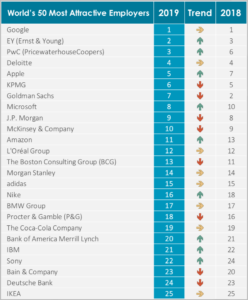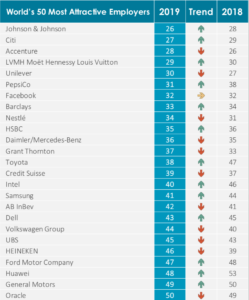I don’t put much stock into “Best Company to Work For” lists. That said, the data provided by Universum in there World’s Most Attractive Employer Report is pretty cool and gives you some insight on how you can help move your organization in the right direction.
What’s wrong with the best places to work lists?
- It only measures those employers who actually do the work to be considered for the list.
- It’s based on data that someone, other than yourself, decided was criteria for being a great place to work. And that might not align with what your org considers to be a great place to work, or the talent you market to, etc.
All that being said, I find that organizations, every single one who tries out for these lists, probably care about their employee and candidate experience at a pretty high level. Are they really the ‘best’ place to work? I don’t know, but they’re trying and that’s more than most of us can say!
So, who are they?
So, you can already see the bias, right? Tech, Business services, big brands. There isn’t one company on the list you haven’t heard of. Doesn’t that seem strange? You mean in the top 50 companies in the WORLD, there isn’t one company we haven’t heard of who is just great? Well, it’s the “World’s 50 Most Attractive”, so the one thing about being “attractive” is you’re probably known, when it comes to lists like these.
What makes you an “Attractive” employer?
1. The ability to have high future earnings (you can make a lot of money) – 49.1%
2. You’ll get professional training and development – 43.8%
3. The job is secure (you won’t get laid off) – 39.1%
4. Working for this brand will help your career in the future – 38.8%
5. You have the ability to be creative – 38.7%
6. The company is successful within the market they compete in – 38.5%
7. The company encourages you to go home once in a while – 38.2%
8. You like the people you work with – 38.2%
9. You have leaders who support and they know how to develop talent – 38%
10. Competitive base salary – 37.6%
Anything pop out at you from the list?
What about #1 and #10? Oh, so, really base salary doesn’t mean anything, as long as I make a lot of money from what I’m doing!?! Turns out we release research and data for a reason. If you’re trying to sell employer branding software, it’s important for employers to understand it’s not about how much you pay because at that point you don’t need a brand, you need to pay the most.
But, it’s not what this data says. Like all modern research around this topic, what you make, is significantly more important than things like ‘being developed” and having “challenging work”. The person has to know and understand that financially this will work out very well for me, and then, all the other stuff becomes important once that question is satisfied.
You can not act like the most important thing on the list (#1 – High Future Earnings) is really that different than the last thing on the list (#10- competitive base salary). Those things are married at the hip if we have any inkling about basic compensation theory on where someone starts their career in base salary vs. the impact that has on future earnings, in the millions of dollars, going forward.
Let’s face it, as an employer you want to be able to deliver each of the ten things on the list in a really good way. If you do, you will not have trouble attracting talent or keeping your best talent.



Great observation. This may seem crass, but to underscore the importance of compensation:
#2 – training means I’m more valuable and can make more money in the long run
#3 – job security means I won’t be without money
#4 – strong brand for career means I’ll get a job elsewhere if I decide to leave (and likely make good money)
#6 – successful company = job security = I will make money
#9 – supportive leaders means job progression and more money